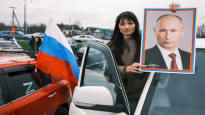The anti-war movement in Russia has been run very tight, writes ‘s St. Petersburg journalist Simo Ortamo.
Russia’s war-torn regime has spared no effort in keeping its citizens obedient and in the dark about the actual course of the war.
The means have been persecution of opponents of the war, unprecedented censorship and increasingly intense propaganda.
The aim is to ensure that the general public stays behind the war. Right now, it seems that the anti-war movement has been run very tight.
On Sunday, the leader of the opposition Alexei Navalnyin supporters summoned anti-war protests.
Everyone who takes part in the demonstration takes a big personal risk. They could be beaten in the tube, get a prison sentence, or lose their job or study.
The protests remained smaller than a year ago when Russia captured Navalny. At the time, authorities dismantled activist networks with harsh punishments and a total ban on the Navalny movement.
Now the screw is tightened even more.
Also media space The Russian regime has taken over the dizzyingly fast.
Authorities have blocked the websites of almost all independent media. Some have been completely discontinued.
Nobel laureate Dmitry Muratov The Novaja Gazeta magazine, led by
The reason was a law passed in Russia on Friday banning the dissemination of “false” information about the armed forces. The penalty is at most 15 years in prison.
It is still unclear how the authorities will interpret the law. Extremely false can be interpreted as any perception that deviates from Russia’s official line, such as calling war a war and not a “special operation.”
Several foreign media outlets, such as the BBC and Bloomberg, have suspended their operations in Russia for the time being due to the law failing to ensure the safety of their workers.
The living space of social media has also deteriorated. Facebook is blocked and Twitter is restricted. Due to the law, Tiktok suspended the making of new updates and live streams from Russia.
The real information about the war can now be obtained mainly in instant messaging applications or by circumventing Internet censorship via a VPN connection.
Russia also initially coughed the propanganda machine has started running. Initially, opinion-shaping was largely the responsibility of state-controlled television channels, but now the administration has begun to mobilize its supporters.
Russia has taken the letter Z as the symbol for its “special operation,” which is one of the symbols painted on the vehicles of the Russian offensive forces.
Over the weekend, a propaganda video appeared on social media in which citizens wearing T-shirts with the letters Z threatened to evict opponents of the war from the streets of Russia. The video is available for viewing On Twitter (switching to another service).
The Ministry of Education, for its part, released an instructional video for schoolchildren claiming Russia would “liberate” Ukrainians and warn of “false” Finnish videos. The video was shown in compulsory lessons all over Russia, LBC radio says. (switch to another service)
Propaganda is now salting slogans and arguments that the Kremlin is trying to reassure supporters of the regime who have been surprised and confused by the start of the war. They are a significant part of the Russians.
In these circumstances, it is unlikely that that a large-scale anti-war movement would rise in Russia, at least immediately. Instead, people have started to leave the country.
When I interviewed people getting on a train in St. Petersburg on Thursday, everyone said they were leaving the country permanently and attributed the war. Many of the departors who were obviously in distress refused to be interviewed.
On Sunday I boarded the train myself towards Helsinki. Almost all of the passengers were Russian and were traveling to, for example, Spain, Cyprus, Turkey or Sweden.
The couple sitting next to me told the border guards that they were going to visit, but had brought in the maximum amount of cash allowed, which is about ten thousand euros in dollars and euros.
Currently, departures are limited by disconnections to the west, and many do not have valid visas abroad in the wake of the pandemic.
It is especially difficult to come to Finland. In addition to a visa, Finland requires the Russians either a corona certificate accepted in the West or a necessary reason to enter Finland.
The desire to leave is also boosted by the downward spiral threatening the economy, as well as rumors that Russia is closing its borders completely.
This is ‘s daily analysis of the current theme of the Russian invasion.
You can discuss the topic until Tuesday, March 8 at 11 p.m.
Analyzes from previous days:
